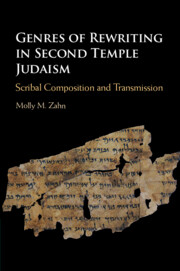Book contents
- Genres of Rewriting in Second Temple Judaism
- Genres of Rewriting in Second Temple Judaism
- Copyright page
- Contents
- Figures
- Tables
- Acknowledgments
- Abbreviations
- Introduction
- 1 Rewriting, Revision, and Reuse
- 2 Genre and Rewriting
- 3 Revision and Reuse in the Bible
- 4 Beyond “Rewritten Bible”
- 5 Translation and/as Rewriting
- 6 Diverse Genres of Reuse
- 7 Second Temple Rewriting in Context
- Conclusion
- Bibliography
- Index of Ancient Sources
- Subject Index
7 - Second Temple Rewriting in Context
Authority, Exegesis, and Scribal Culture
Published online by Cambridge University Press: 05 June 2020
- Genres of Rewriting in Second Temple Judaism
- Genres of Rewriting in Second Temple Judaism
- Copyright page
- Contents
- Figures
- Tables
- Acknowledgments
- Abbreviations
- Introduction
- 1 Rewriting, Revision, and Reuse
- 2 Genre and Rewriting
- 3 Revision and Reuse in the Bible
- 4 Beyond “Rewritten Bible”
- 5 Translation and/as Rewriting
- 6 Diverse Genres of Reuse
- 7 Second Temple Rewriting in Context
- Conclusion
- Bibliography
- Index of Ancient Sources
- Subject Index
Summary
Applies the results of the previous chapters to larger questions about early Jewish textual culture. Argues that rewriting cannot be associated narrowly, as it has been in the past, with “authoritative” or “scriptural” texts, and cannot be construed primarily as a type of biblical interpretation. Though inherently interpretive because of its engagement with earlier traditions, rewriting was a much more widespread textual strategy. The chapter then situates early Jewish rewriting in the broader historical context: unlike in neighboring Mesopotamia, where increased interest in the divine origins and authorship of texts resulted in a decrease in rewriting, early Jewish rewriting persisted despite a comparable textualization of revelation. Whether due to ideas of scribal inspiration or concepts of revelation as limitless/gradually unfolding, early Jewish scribes saw it as their duty to actively reshape the sacred traditions handed on to them.
Keywords
- Type
- Chapter
- Information
- Genres of Rewriting in Second Temple JudaismScribal Composition and Transmission, pp. 196 - 226Publisher: Cambridge University PressPrint publication year: 2020

